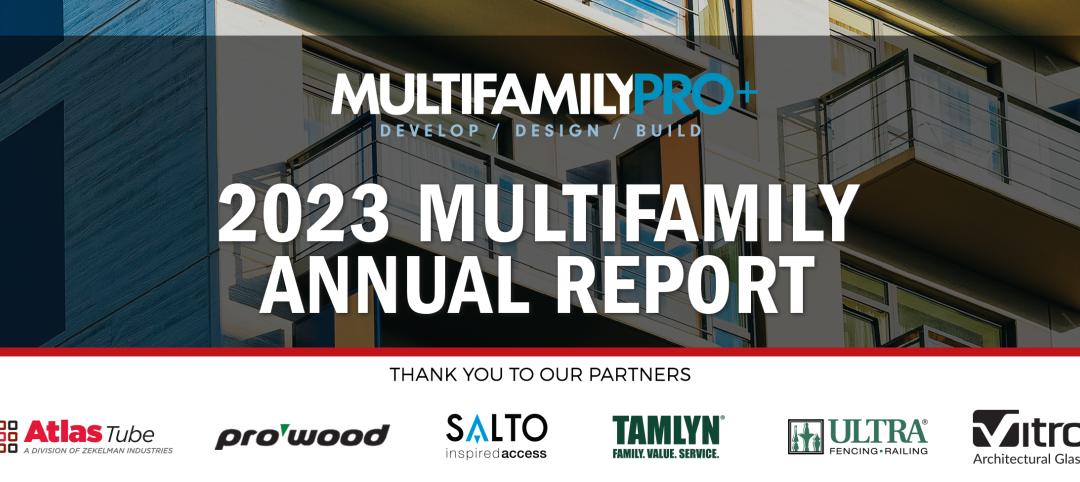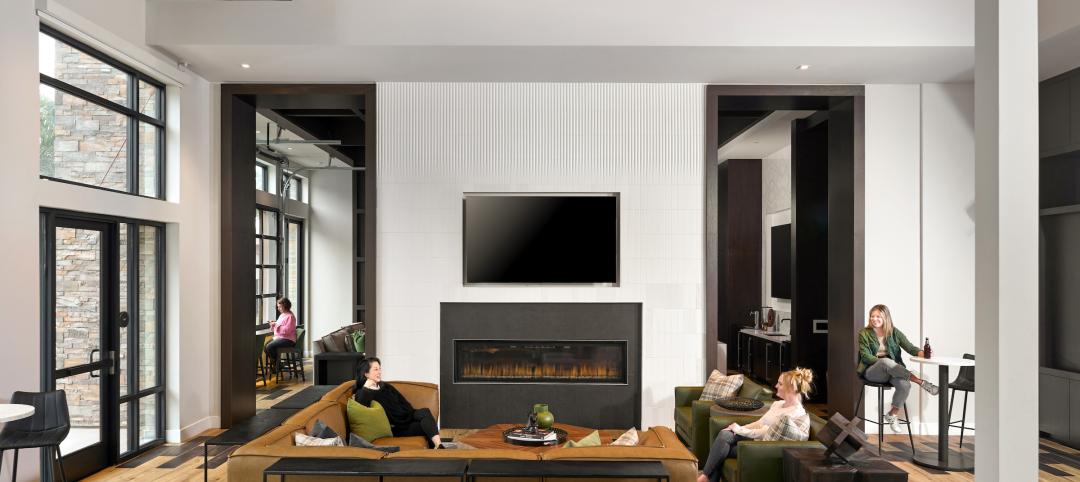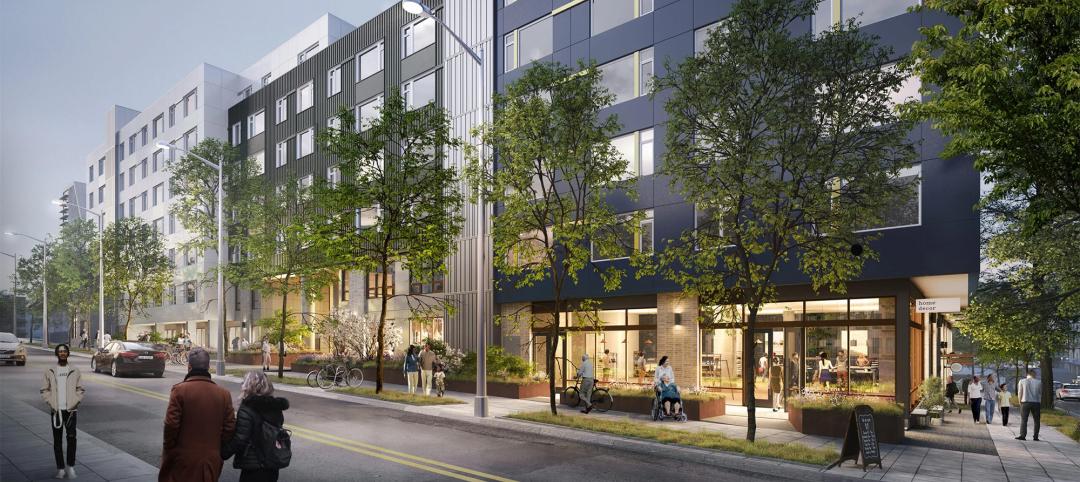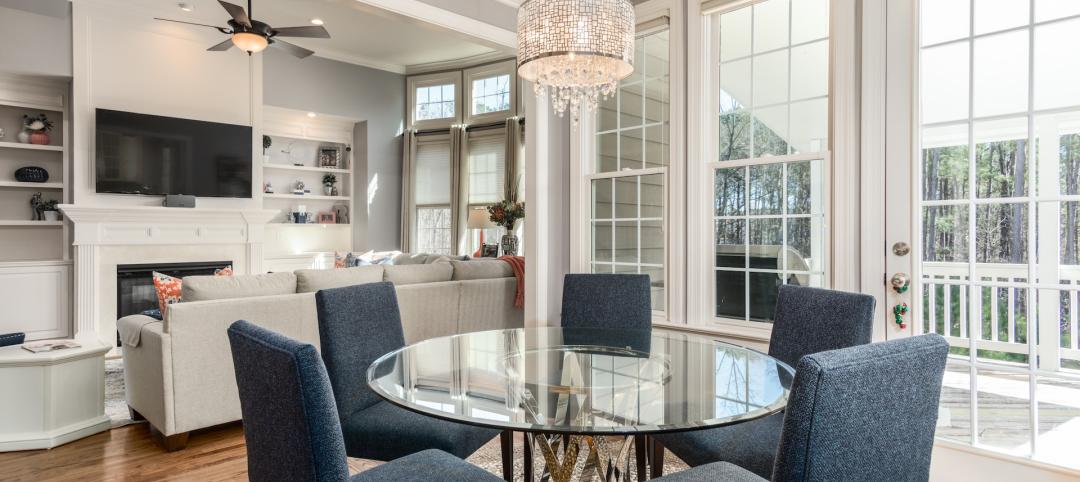Building Teams for apartments, senior living, and other multifamily residential projects may be seeing gray this year, at least in kitchens and bathrooms. Gray color schemes for both types of spaces have grown dramatically in popularity, according to a new National Kitchen & Bath Association Top 10 trends report. Used currently in 55% of kitchens and 56% of bathrooms, gray conveys a sense of chic sophistication, according to the NKBA. White, off-white, beige, and bone also remain very popular, and sepia tones are on the rise.
Transitional-style kitchens and baths—defined as a "seamless blend of traditional and contemporary"—have surpassed traditional styles, which reigned until 2012. Quartz finishes are another "clear trendsetter" for 2013, according to NKBA survey respondents, consisting of ~300 member designers in the U.S. and Canada. Though quartz saw a slight popularity decline in 2012, it is now a close second to perennial favorite granite.
Additional top trends for kitchens include white-painted cabinetry, glass backsplashes, LED lighting, touch-activated faucets, and satin-nickel finishes. Bathroom trends include an increased use of ceramic/porcelain tiles and undermount sinks.
Here's a recap of the top 10 kitchen and bath design trends for 2013 (download the full report at http://www.nkba.org/PressRelease/2013_NKBA_Kitchen_and_Bath_Style_Report.pdf):
KITCHENS & BATHROOMS
1. Shades of Gray
In kitchens, shades of gray have noticeably jumped in use over the past three years. There was a significant increase from 9% of kitchens in 2010 to a remarkable 55% in the final three months of 2012. Similar to kitchens, grays in bathroom remodels have risen from 12% to 56% since 2010.
Whites and off-whites remain the top color schemes of both kitchens and bathrooms, used in 73% and 71%, respectively, an increase of 6 percentage points in both categories over the past year. Beiges and bones remain the second most popular color scheme in both rooms, followed by grays and then browns. Browns are slightly in decline in bathrooms, falling from 39% in 2012 to 35% this year, but sepia tones rose from 11% to 17% in kitchens and 11% to 18% in bathrooms.
2. Rise of Quartz
Quartz was the second most popular counter-surface material used in kitchens and baths last year. This year, it has significantly narrowed the gap with granite, increasing from 69% to 80% in kitchens and from 53% to 65% in bathrooms. Meanwhile, granite held steady in 2013, with 87% usage in kitchens and 71% in bathrooms.
Identified as the key trend for 2012, the popularity of solid surfaces in kitchens continues to rise, growing from 11% in 2010 to 35% in 2013. Marble still remains a popular bathroom vanity-top material, only moderately dipping in popularity from 46% in 2010 to 39% this year.
3. Trending Transitional Styles
In 2012, the popularity of transitional style — a seamless blend of traditional and contemporary — exceeded that of its traditional counterpart, which had been the clear topper in 2010 and 2011. In our latest survey, transition expanded its lead in the kitchen, with usage growing from 59% to 69%, Likewise, transitional styles in the bathroom are still positioned #1, currently used by 61% of NKBA-member designers.
As a consequence, traditional styles sit in second place in both rooms, their popularity holding steady at 60% in kitchens and 58% in bathrooms. Contemporary designs secured a close third in the most recent poll, maintaining a steady 52% usage in kitchens and increasing slightly from 53% to 57% in bathrooms.
KITCHENS ONLY
4. White Painted Cabinetry
Among painted cabinetry, white has stayed on top of the chart since last year. Given its remarkable, upward climb over the past three years, it’s clearly no fad. The popularity of white-painted cabinetry jumped from 47% to 59% in 2012 and further increased to 67% this year.
Use of light, medium and natural finishes has remained more or less consistent over the past year. Light finishes are currently used by 30% of respondents, medium finishes by 54%, and dark finishes by 55%. Use of glazed finishes, which held at 44% in 2011 and 2012, increased by four percentage points this year.
5. Glass Backsplash
The preference for glass splashes has grown dramatically over the past three years: from 42% in 2010 to 64% this year. At the same time, while natural stone tile showed consistent growth during 2011 and 2012, usage dropped from 60% to 55% in the latest survey. Ceramic or porcelain tiles held its top position for the third consecutive year, but overall usage fell by 11 percentage points between 2010 (88%) and now (77%).
6. LED Lighting
Energy-efficient lighting is widely used by member designers in both the United States and Canada. As consumer awareness of energy efficiency has risen, it comes as no surprise that light-emitting diode, or LED, lighting is being specified by a higher percentage of designers, increasing from 70% to 77% over the past year. The significant uptick from 50% in 2010 indicates that this trend has serious staying power.
Meanwhile, there has been no significant change in the use of compact fluorescent lighting (CFL) and incandescent bulbs, with current usage at 26% and 41%, respectively.
7. Touch-activated Faucets
Growing in popularity are touch-activated faucets, specified by 32% of member designers, versus only 20% of designers in 2011 and 2012. Pull-out faucets are still in the top position, as they have been since 2010, with usage rising from 88% in 2010 to 94% this year. Pot filler faucets grab the second spot this year, gaining five percentage points over the past year to 33%.
8. Satin Nickel on the Rise
When it comes to faucet finishes in kitchens, satin nickel has been on the top since 2011, its usage increasing from 42% in 2010 to 60% this year. Bronze or oil-rubbed bronze finishes are also being specified more often, growing from 41% to 50% in the past year. The increased popularity of these three finishes most likely comes at the expense of polished nickel and polished chrome. The latter, which had seen a rise in usage in 2012, dipped from 52% to 47% in the latest survey; polished nickel dropped from 25% to 20%.
BATHROOMS ONLY
9. Ceramic/Porcelain Tiles
Ceramic or porcelain tile flooring has been in slight decline over the past two years, but it remains the most popular of all materials, specified by 83% of the survey participants this year — down from 93% in 2011. Natural stone tiles have also declined since 2011 dropping from 77% to 59% in 2012, and to 57% this year. However, they have been the second most popular type of flooring used since 2011.
10. Undermount sink
Undermounts are in slight decline this year, dropping from 94% in 2012 to 87%. But here again, they remain the most specified type of lavoratory sink — not just in the latest poll, but over the past 3 years. Integrated sink/tops have seen modest growth, increasing from 35% in 2012 to 41% currently.
For the full report, visit: http://www.nkba.org/PressRelease/2013_NKBA_Kitchen_and_Bath_Style_Report.pdf.
Related Stories
MFPRO+ Special Reports | Oct 27, 2023
Download the 2023 Multifamily Annual Report
Welcome to Building Design+Construction and Multifamily Pro+’s first Multifamily Annual Report. This 76-page special report is our first-ever “state of the state” update on the $110 billion multifamily housing construction sector.
Giants 400 | Oct 23, 2023
Top 190 Multifamily Architecture Firms for 2023
Humphreys and Partners, Gensler, Solomon Cordwell Buenz, Niles Bolton Associates, and AO top the ranking of the nation's largest multifamily housing sector architecture and architecture/engineering (AE) firms for 2023, as reported in Building Design+Construction's 2023 Giants 400 Report. Note: This ranking factors revenue for all multifamily buildings work, including apartments, condominiums, student housing facilities, and senior living facilities.
Affordable Housing | Oct 20, 2023
Cracking the code of affordable housing
Perkins Eastman's affordable housing projects show how designers can help to advance the conversation of affordable housing.
Senior Living Design | Oct 19, 2023
Senior living construction poised for steady recovery
Senior housing demand, as measured by the change in occupied units, continued to outpace new supply in the third quarter, according to NIC MAP Vision. It was the ninth consecutive quarter of growth with a net absorption gain. On the supply side, construction starts continued to be limited compared with pre-pandemic levels.
Warehouses | Oct 19, 2023
JLL report outlines 'tremendous potential' for multi-story warehouses
A new category of buildings, multi-story warehouses, is beginning to take hold in the U.S. and their potential is strong. A handful of such facilities, also called “urban logistics buildings” have been built over the past five years, notes a new report by JLL.
Building Materials | Oct 19, 2023
New white papers offer best choices in drywall, flooring, and insulation for embodied carbon and health impacts
“Embodied Carbon and Material Health in Insulation” and “Embodied Carbon and Material Health in Gypsum Drywall and Flooring,” by architecture and design firm Perkins&Will in partnership with the Healthy Building Network, advise on how to select the best low-carbon products with the least impact on human health.
Contractors | Oct 19, 2023
Crane Index indicates slowing private-sector construction
Private-sector construction in major North American cities is slowing, according to the latest RLB Crane Index. The number of tower cranes in use declined 10% since the first quarter of 2023. The index, compiled by consulting firm Rider Levett Bucknall (RLB), found that only two of 14 cities—Boston and Toronto—saw increased crane counts.
Office Buildings | Oct 19, 2023
Proportion of workforce based at home drops to lowest level since pandemic began
The proportion of the U.S. workforce working remotely has dropped considerably since the start of the Covid 19 pandemic, but office vacancy rates continue to rise. Fewer than 26% of households have someone who worked remotely at least one day a week, down sharply from 39% in early 2021, according to the latest Census Bureau Household Pulse Surveys.
Luxury Residential | Oct 18, 2023
One Chicago wins 2023 International Architecture Award
One Chicago, a two-tower luxury residential and mixed-use complex completed last year, has won the 2023 International Architecture Award. The project was led by JDL Development and designed in partnership between architecture firms Goettsch Partners and Hartshorne Plunkard Architecture.
Giants 400 | Oct 17, 2023
Top 130 Sports Facility Architecture Firms for 2023
Populous, Gensler, HOK, and HKS head BD+C's ranking of the nation's largest sports facility architecture and architecture/engineering (AE) firms for 2023, as reported in Building Design+Construction's 2023 Giants 400 Report.

















